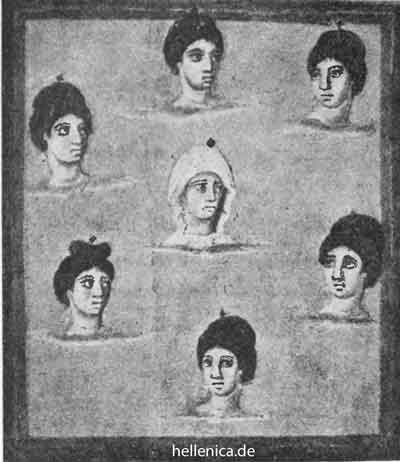.

The Pleiades (Πλειάδες) (pleye'-a-deez, also plee'-a-deez), companions of Artemis (ar'-te-mis), were the seven daughters of the Titan Atlas (at'-las) and the sea-nymph Pleione (pleye-oh'-nee) born on Mt. Cyllene (seye-lee'-nee). They are the sisters of Calypso, Hyas, the Hyades, and the Hesperides. The Pleiades were nymphs in the train of Artemis, and together with the seven Hyades were called the Atlantides, Dodonides, or Nysiades, nursemaids and teachers to the infant Bacchus.
There is some debate as to the origin of the name Pleiades. Previously, it was accepted the name is derived from the name of their mother, Pleione. However, the name Pleiades is more likely to come from πλει̂ν (to sail), because the Pleiades star cluster are visible in the Mediterranean at night during the summer, from the middle of May until the beginning of November, which coincided with the sailing season in antiquity. This derivation was recognized by the ancients, including Vergil (Georgics 1.136-138).

(Pleiades Star Cluster) (NASA Image), observed by Agrippa in 92 AD

The so called Nebra Disc discovered in Germany probably showing the earliest image of the Pleiades.

Pleiades, Codex Vossianus 79
The Seven Sisters
Indeed, the Pleiades must have had considerable charms, for several of the most prominent male Olympian gods (including Zeus, Poseidon, and Ares) engaged in affairs with the seven heavenly sisters - and inevitably, these relationships resulted in the birth of children:
- Celaeno (se-lee'-noh) was mother of Lycus by Poseidon.
- Alcyone (al-seye'-a-nee) was mother of Hyrieus by Lycus.
- Electra (e-lek'-tra) was mother of Dardanus and Iasion by Zeus.
- Maia (may'-a, also meye'-a), eldest of the seven Pleiades, was mother of Hermes by Zeus.
- Sterope (stair'-a-pee) (also Asterope) was mother of Oenomaus by Ares.
- Taygete (tay-ij'-i-tee) was mother of Lacedaemon, also by Zeus.
All of the Pleiades, except Merope (mair'-a-pee), had affairs with gods.
Mythology
After Atlas was forced to carry the world on his shoulders, Orion began to pursue all of the Pleiades, and Zeus transformed them first into doves, and then into stars to comfort their father. The constellation of Orion is said to still pursue them across the night sky.
In the Pleiades star cluster only six of the stars shine brightly, the seventh, Merope, shines dully because she is shamed for eternity for having an affair with a mortal. Some myths also say that the star that doesn't shine is Electra, mourning the death of Dardanus, though a few myths say it is Sterope.
One of the most memorable myths involving the Pleiades is the story of how these sisters became, quite literally, stars. According to some versions of the tale, all seven sisters committed suicide because they were so saddened by either the fate of their father, Atlas, or the loss of their siblings, the Hyades. In turn Zeus, the ruler of the Greek gods, immortalized the sisters by placing them in the sky. There these seven stars formed the constellation known thereafter as the Pleiades.
The Greek poet Hesiod mentions the Pleiades several times in his Works and Days. As the Pleiades are primarily summer stars, they feature prominently in the ancient agricultural calendar. Here is a bit of advice from Hesiod:
"And if longing seizes you for sailing the stormy seas,
when the Pleiades flee mighty Orion
and plunge into the misty deep
and all the gusty winds are raging,
then do not keep your ship on the wine-dark sea
but, as I bid you, remember to work the land."
See also : Greek Mythology. Paintings, Drawings
| Ancient Greece
Science, Technology , Medicine , Warfare, , Biographies , Life , Cities/Places/Maps , Arts , Literature , Philosophy ,Olympics, Mythology , History , Images Medieval Greece / Byzantine Empire Science, Technology, Arts, , Warfare , Literature, Biographies, Icons, History Modern Greece Cities, Islands, Regions, Fauna/Flora ,Biographies , History , Warfare, Science/Technology, Literature, Music , Arts , Film/Actors , Sport , Fashion --- |
Retrieved from "http://en.wikipedia.org"
All text is available under the terms of the GNU Free Documentation License




